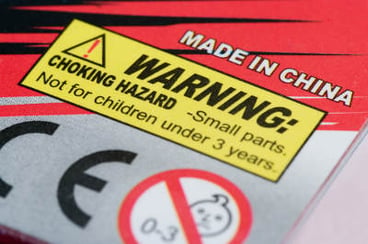Back in March, many of us were stunned to hear about the formaldehyde scandal in North America’s largest distributor of wood flooring. A story released this past Tuesday prompted me to revisit the issue of product recalls and ways to prevent these types of issues in supply chains.
Like the flooring distributor, the New York trading company mentioned in the news this week was importing products from China. In the case of this importer, however, the product was a hard candy found to contain possibly dangerous preservatives. It’s believed these preservatives could cause some consumers to have a life-threatening allergic reaction. And although the product contained more than 3 times the amount of these sulfites needed to cause allergies, the importer failed to correctly label the product.
Before going any further, I want to preface this with a reminder of a conclusion we reached in an earlier article, Do Chinese Factories Care About Quality? The conclusion was that most Chinese factories do, in fact, care about manufacturing a quality product. This article is not going to challenge that conclusion. In truth, it’s quite possible the factory that produced the hard candy was unaware of the potential hazards associated with using these “undeclared” preservatives. And that’s where we arrive at the crux of the issue.
Who’s to Blame for a Product Recall?
It’s important to recognize where the responsibility falls for ensuring a product meets both quality and safety  standards. Although a case can be made for holding different layers of the supply chain accountable, in this case, the responsible party should be clear. The importer should always be intimately aware of the products they’re buying and selling. This may seem like a simple concept. But when you realize just how much trading companies rely on high volumes and low costs to be profitable, the lack of oversight and transparency is less surprising. That's not to say there aren't reputable trading companies that keep a close watch on their product quality and standards. But as soon as an importer acts as a distributor, they assume responsibility for the safety of the product they're selling.
standards. Although a case can be made for holding different layers of the supply chain accountable, in this case, the responsible party should be clear. The importer should always be intimately aware of the products they’re buying and selling. This may seem like a simple concept. But when you realize just how much trading companies rely on high volumes and low costs to be profitable, the lack of oversight and transparency is less surprising. That's not to say there aren't reputable trading companies that keep a close watch on their product quality and standards. But as soon as an importer acts as a distributor, they assume responsibility for the safety of the product they're selling.
How to Avoid a Product Recall
Product recalls often occur when a product poses a danger to the consumer of which the manufacturer is unaware. In other cases, a product recall might be necessary when the manufacturer is aware of a safety issue, but fails to adequately warn consumers. There are two ways this importer could have prevented a product recall.
Avoid a Product Recall through Lab Testing
It’s not clear whether the importer in this case was aware of the dangers posed, or even the mere presence of, these sulfites in their product. One way they could have been sure was to have a sample of the hard candies sent to a qualified lab for testing. Professional third-party labs can carry any number of certifications, such as that for the FDA. Different labs are better suited to test food products for safety than others. The importer could be sure that their product was safe by having it tested in a qualified lab.
Avoid a Product Recall through Product Inspection
Perhaps the importer was well aware of the safety risks posed by the high level of these particular preservatives in their product. Still, the hard candies were not adequately labeled to inform the consumer of this risk. This is where the importer clearly made an error. QC product inspection, performed with standards in  mind before shipment, would have easily uncovered this error.
mind before shipment, would have easily uncovered this error.
As an integral part of most final product inspections, verifying packaging requirements often finds any issues related to barcodes, packing method and labeling. If a product is packed in a polybag, for example, many buyers require the polybag to include air holes and a written warning to notify consumers that the bag poses a safety hazard to children. This kind of packaging requirement is one that product inspection frequently verifies. Likewise, had this importer adequately inspected the candies after packaging, or hired a professional third-party to do so on their behalf, they would have easily found the mislabeling issue. They could have asked the factory to relabel the product before shipment and avoided the costly recall.
Conclusion
Product recalls are a risk many manufacturers face, especially those manufacturers that handle food products. In this case, an importer of hard candies containing potentially hazardous preservatives mislabeled their product. This led them to recall their product, likely damaging the trading company’s reputation.
So how could the product recall been avoided? First the importer could have had the product tested for safety by a qualified third-party lab. Second the importer could have had the product inspected to make sure the candies were adequately labeled so that consumers were aware of the risk.
This story in recent news serves as one more example of how NOT to handle quality control. So make sure you’re taking your product quality seriously to avoid a product recall!






